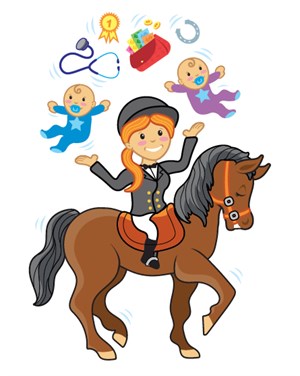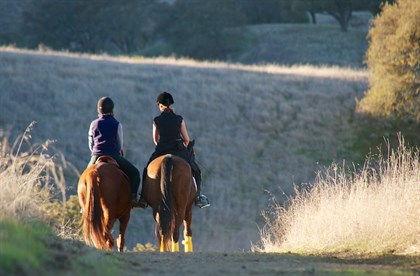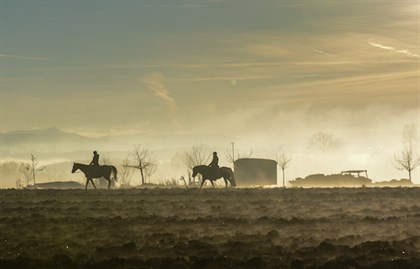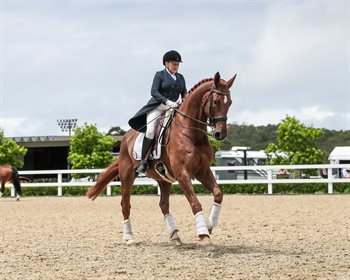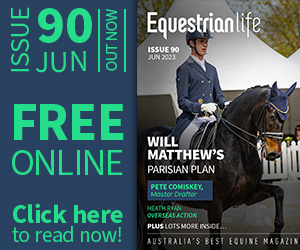
This article has appeared previously with Equestrian Life. To see what's in the current issue, please click here
21st century life just seems to roll on faster and faster. We all seem to be juggling many things. Horses have to fit in with work and family commitments. We are asked to volunteer in the sport. How can we do it all?
By Dr Kerry Mack
I AM OFTEN asked how I manage to combine the things I do. Over the years I have come across some strategies that help. I do not always succeed but for what it's worth, here are some things you can try.
Firstly, always remember that very few people accomplish anything on their own. A lot of the pleasure in participating in anything is the relationships with other people. Try to remember your helpers. Make sure they know how much you appreciate them, and try to ensure they have fun too, so they stick around and you all have fun together. Delegate when you can. People like to be part of a team. If someone offers to help, say “yes, thank you”.
Take time to plan. Think about what you have to do and how it fits together. Time spent planning saves time. Work out what can be delegated, what can be simplified, what can be prepared in advance and what is the most efficient way to get everything done. Multi-tasking doesn't work. It is more effective to do one thing at a time.
If life is too stressful, go for a hack.
© Don DeBold
Prioritising is really important. Some things are important, some are not. Some important things are urgent, some are not. Urgent important things must take priority, but don't relegate important but not urgent things to the bottom of the heap. Some things are not urgent and not important, so they go below the line, ie, I don't do them. Then there are the things that can feel urgent but not actually important. Try to do what is most important first. These days I like to ride in the morning, but there was a time when I rode after work, or when the kids we're asleep. What is most important will depend on your goals at the time. The welfare of the horse is always important. Ensuring that shoeing is timed so that shoes are neither too new (in case of pricking etc.) nor becoming loose before that competition you are working for. Replacing a lost shoe is urgent and important. Getting entries in for a competition is really important but may not feel urgent, so it may get postponed until it becomes urgent, or you may find the classes are full and you have missed out. It is important to learn your dressage test well before the competition so you can be sure that you have trained your horse to do the required movements. But this may not feel urgent and may not get done. Some things can feel urgent but not actually be important. You may want nice new equipment for the show, but if you are time-poor it is probably more important to make sure that your horse has been worked than to do that extra shopping trip. Old gear, well maintained, will do the job.
Putting things away at the end of a show may not seem urgent or important when you are in a rush to get home, but the time taken will be repaid in time saved searching for things, or replacing things. Try to have a place for everything, and everything in its place.
When you are planning, try to do urgent and important things before important but not urgent before getting around to urgent but not important. Things that are not urgent and not important are below the line.
When you are busy, riding in the morning can be the best way to fit it in.
© Sera Photography
Be flexible. One strategy will not fit all circumstances. There are times when it is important to be obsessional and perfectionistic, and times when “good enough” is better. If you are preparing for a big championship, everything must be right, no stone unturned in the pursuit of excellence. Time must be taken in ensuring your horse is at peak fitness, as are you, all your gear is right, your vehicle serviced, etc. Then at other times you might be squeezing your riding into a smaller space in your life, as work or family might need to be a priority. At this time you might not be able to be so perfectionistic and it’s better to be “good enough” rather than “not at all”. Get what needs to be done, done, and let go of the things that can't. Gear might not be so clean, freestyles might not be so practised, and fitness might not be peak. Good enough should never compromise your horse’s welfare. At those times you may accept a lesser performance result too.
Set goals that are realistic. They must be realistic in view of the other things in your life. It is only discouraging to set unrealistic goals and then fail at them. For example, when I was studying I would make a plan for the season that would take into account exams etc. Sometimes I would go to a show and only compete in a fairly soft level, socialise, have fun, and be aware that if I hadn't been able to prepare properly I could not expect my horse to perform at the same level that he might if I was able to be more focussed. So sometimes the riding was part of my mental health plan for the rest of my life. Go along, enjoy it, and don’t put pressure on yourself or your horse. Just make sure that your horse is well enough prepared to do the job safely for you both. He needs to be fit enough for the job and have had enough work to be safe. I might just take one or two to a local show, take the books, study a bit and ride and socialise a bit. Give yourself a break sometimes and don't take the books; have a day off.
There are times that I might choose not to compete, but rather train and improve without the pressure of competition. This may be necessary for your horse, or it may be the best fit with a busy life. Even when I am busy I will try to ride my horses. Generally horses don't improve when they are left in the paddock. Sometimes young horses will improve with some time off, but if your horse gets better when you don't ride him, you probably need some lessons from a trainer. I think it's ideal to be able to ride each horse five times a week for 40 minutes or more (allowing for warming up and cooling down). However, sometimes if I have a busy day I will ride for even 15 minutes, but be very focussed on one lesson. For example, I might introduce a new exercise such as shoulder-in or flying changes, and just get a good reaction to the one task, finish and do more again tomorrow. If you haven't got time, don't choose something too difficult, because you need to be able to finish what you start. I might just decide to work on something like collecting the trot, or making him quick off the leg, where I know he won't find it provocative. Trot, canter, trot transitions and trot-halt transitions, or getting the best trot you can and keeping it as you make the circle smaller, are all excellent exercises. He gives me a good feeling in the exercise I choose for the day and then I put him away. If I have even less time, or am feeling too stressed, I might do something in-hand, or clicker training. When I have the least time, I am likely to be the most stressed, and therefore more vulnerable to make a training mistake, like getting annoyed with my horse. So I try to take that into account and not do something that could go wrong. Maybe go for a short hack if life is too stressful, or some cross training with poles or small jumps.
Alternatively, there might be times when you have set a serious goal when you have to clear the decks of other responsibilities to focus on that goal. Be perfectionistic at those times. When I took Pzazz to the World Young Horse Championships I cleared the decks of just about everything. Be clear about your goals and focus on what you have to do to achieve them. When Pzazz was four I decided that I just wanted to focus on him. I gave up riding the mare I had worked so hard for years to get to the FEI classes. With two small children I could only focus on one horse properly. It was not satisfying to do too much and do it badly. I enjoyed Pzazz so much more when I could be focussed on him.
Kerry Mack and Mayfield Limelight.
© Amy-Sue Alston
When you are planning your time also think about whether you are living up to your own values. Sometimes we can deceive ourselves here. If you value excellent performance you may have to miss out on that social function that tempts you. If you value being available for your children, you may need to rethink your commitment to the horses for a few years. We tend to think that we can have everything, but this is rarely true. Someone pays the price. It should not be your horse, and I think it should not be your kids.
Most important is to enjoy the journey, whatever it is. It doesn't help to envy others who seem to have it easier. Don't get caught up in what you can't do, but get involved in what you can do. Have fun.
READ THE LATEST NEWS ARTICLES HERE
https://www.equestrianlife.com.au/articles/The-juggling-act
